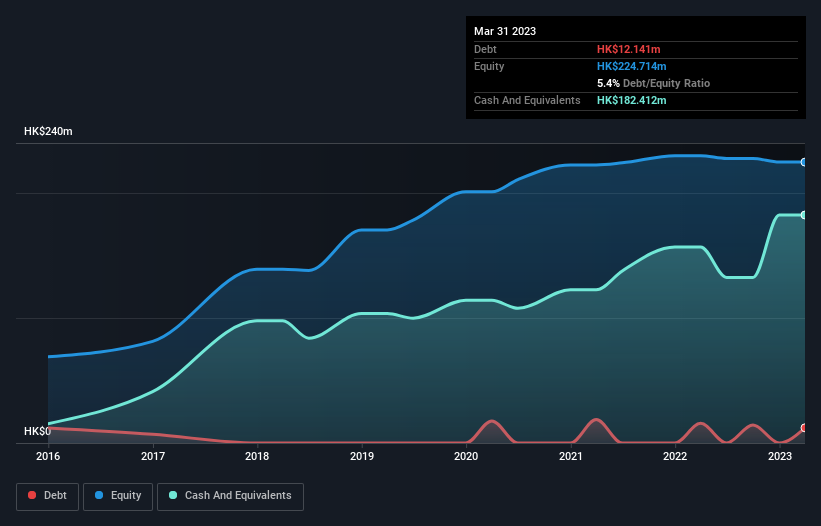Some say volatility, rather than debt, is the best way to think about risk as an investor, but Warren Buffett famously said that 'Volatility is far from synonymous with risk.' It's only natural to consider a company's balance sheet when you examine how risky it is, since debt is often involved when a business collapses. Importantly, Takbo Group Holdings Limited (HKG:8436) does carry debt. But is this debt a concern to shareholders?
Why Does Debt Bring Risk?
Generally speaking, debt only becomes a real problem when a company can't easily pay it off, either by raising capital or with its own cash flow. In the worst case scenario, a company can go bankrupt if it cannot pay its creditors. However, a more common (but still painful) scenario is that it has to raise new equity capital at a low price, thus permanently diluting shareholders. Having said that, the most common situation is where a company manages its debt reasonably well - and to its own advantage. The first step when considering a company's debt levels is to consider its cash and debt together.
Check out our latest analysis for Takbo Group Holdings
What Is Takbo Group Holdings's Net Debt?
As you can see below, Takbo Group Holdings had HK$12.1m of debt at December 2022, down from HK$15.7m a year prior. However, its balance sheet shows it holds HK$182.4m in cash, so it actually has HK$170.3m net cash.

How Strong Is Takbo Group Holdings' Balance Sheet?
According to the last reported balance sheet, Takbo Group Holdings had liabilities of HK$30.0m due within 12 months, and liabilities of HK$8.74m due beyond 12 months. Offsetting this, it had HK$182.4m in cash and HK$15.2m in receivables that were due within 12 months. So it can boast HK$158.9m more liquid assets than total liabilities.
This luscious liquidity implies that Takbo Group Holdings' balance sheet is sturdy like a giant sequoia tree. On this view, lenders should feel as safe as the beloved of a black-belt karate master. Succinctly put, Takbo Group Holdings boasts net cash, so it's fair to say it does not have a heavy debt load! The balance sheet is clearly the area to focus on when you are analysing debt. But you can't view debt in total isolation; since Takbo Group Holdings will need earnings to service that debt. So if you're keen to discover more about its earnings, it might be worth checking out this graph of its long term earnings trend.
In the last year Takbo Group Holdings's revenue was pretty flat, and it made a negative EBIT. While that's not too bad, we'd prefer see growth.
So How Risky Is Takbo Group Holdings?
Although Takbo Group Holdings had an earnings before interest and tax (EBIT) loss over the last twelve months, it generated positive free cash flow of HK$41m. So taking that on face value, and considering the net cash situation, we don't think that the stock is too risky in the near term. The next few years will be important as the business matures. There's no doubt that we learn most about debt from the balance sheet. But ultimately, every company can contain risks that exist outside of the balance sheet. Be aware that Takbo Group Holdings is showing 2 warning signs in our investment analysis , and 1 of those doesn't sit too well with us...
If, after all that, you're more interested in a fast growing company with a rock-solid balance sheet, then check out our list of net cash growth stocks without delay.
Valuation is complex, but we're here to simplify it.
Discover if Takbo Group Holdings might be undervalued or overvalued with our detailed analysis, featuring fair value estimates, potential risks, dividends, insider trades, and its financial condition.
Access Free AnalysisHave feedback on this article? Concerned about the content? Get in touch with us directly. Alternatively, email editorial-team (at) simplywallst.com.
This article by Simply Wall St is general in nature. We provide commentary based on historical data and analyst forecasts only using an unbiased methodology and our articles are not intended to be financial advice. It does not constitute a recommendation to buy or sell any stock, and does not take account of your objectives, or your financial situation. We aim to bring you long-term focused analysis driven by fundamental data. Note that our analysis may not factor in the latest price-sensitive company announcements or qualitative material. Simply Wall St has no position in any stocks mentioned.
About SEHK:8436
Takbo Group Holdings
An investment holding company, designs, develops, manufactures, and sells beauty products in the United States, People’s Republic of China, Mexico, Belgium, Canada, the United Kingdom, Ireland, Hong Kong, and internationally.
Flawless balance sheet with slight risk.
Market Insights
Community Narratives


Recently Updated Narratives


Alphabet: The Under-appreciated Compounder Hiding in Plain Sight


MINISO's fair value is projected at 26.69 with an anticipated PE ratio shift of 20x


The Quiet Giant That Became AI’s Power Grid
Popular Narratives


The company that turned a verb into a global necessity and basically runs the modern internet, digital ads, smartphones, maps, and AI.


MicroVision will explode future revenue by 380.37% with a vision towards success



